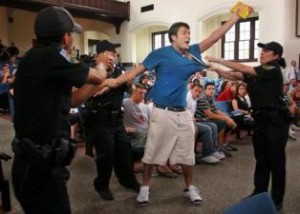Even the rich and famous run into trouble with the law, as evidenced by Reese Witherspoon’s recent arrest for Disorderly Conduct. What is Disorderly Conduct, and what kind of trouble can it cause for a person in Oregon? Read on…
Disorderly Conduct is Causing Public Alarm
In short, the crime of Disorderly Conduct is causing some sort of alarm or inconvenience in public. There are a variety of ways that a person can be accused of Disorderly Conduct: by fighting, by engaging in threatening or tumultuous behavior, by being too loud, by disturbing a gathering of others without cause, by blocking a roadway or sidewalk, by gathering and then refusing to leave when lawfully ordered by the police, by creating a dangerous or offensive condition, or spreading a false story regarding a fire, crime, or other serious condition. Many of these things are illegal only because they are done in public, or else done to cause alarm to the public.
Disorderly Conduct is Often Charged with Other Crimes
Disorderly Conduct can be the only thing that a person is charged with after being arrested, as was the case with Reese Witherspoon. Often it is charged along with other crimes. If someone is in a public fight, they could easily be charged with some form of assault and harassment along with Disorderly Conduct. If someone lies to the police about being the victim of a crime, they can be charged with Disorderly Conduct along with the charge of Filing a False Police Report. And if a person physically refuses to leave a public gathering after a cop lawfully tells them to, they could easily end up with Resisting Arrest charges along with Disorderly Conduct.
Disorderly Conduct Can be Serious
Most charges of Disorderly Conduct are Oregon are charged in the Second Degree and are B Misdemeanors. This means that they carry a maximum of 6 months in jail and/or a fine of $2,500, though more likely a person convicted of Disorderly Conduct in the Second Degree would start out with probation. Depending on the circumstances of the arrest, they may be ordered to undergo anger management or some type of substance abuse treatment. Disorderly Conduct in the First Degree is usually an A Misdemeanor so is more serious; it carries up to 1 year in jail and/or a fine of $6,250. If the person doesn’t have a criminal history, however, then again they could expect to be given a chance to succeed on probation prior to any jail time. Disorderly Conduct is charged in the First Degree if it involves a false report of a danger (such as a fire, explosion, or hazardous substance) at a school. First Degree Disorderly Conduct can also be brought up to a C Felony if the person has already been convicted of the same crime before. The felony is very serious, carries up to 5 years prison and/or a fine of $125,000, and could lead to substantial jail or prison time depending on the person’s criminal history.
You Can Fight Disorderly Conduct Charges
As with any criminal charges, it is important to speak to an experienced criminal attorney if you find yourself arrested for Disorderly Conduct. Depending on the facts of your individual case, you could fight the charge in a variety of ways. Because Disorderly Conduct involves actions in public, there are times when the charges can be fought because of violation of First Amendment Rights. If you are charged with Disorderly Conduct in Oregon, be sure to discuss your case thoroughly with an experienced criminal defense attorney before making any decisions.